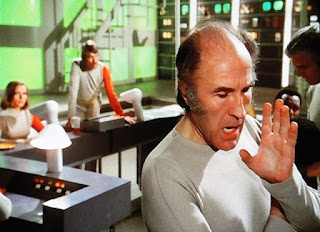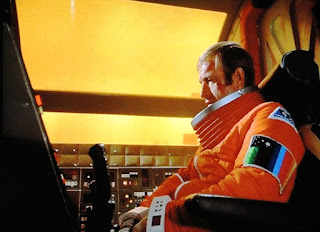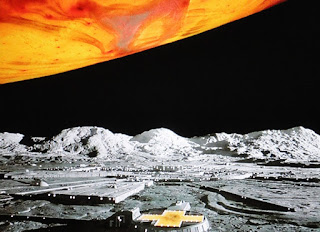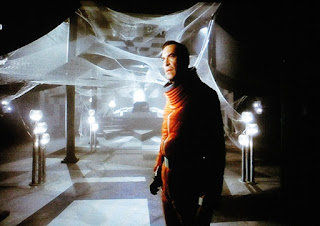"It's a thing called faith."
-Professor Victor Bergman-
"It was a human decision."
-Professor Victor Bergman-
Musings Of A Sci-Fi Fanatic returns with another sci-fi gem for a classic revisit of a former feature here at the blog called FAB FRIDAY, honoring the world of all things Gerry and Sylvia Anderson, two wonderful creators that are sadly no longer with us. When we began writing FAB FRIDAY posts back in 2010, both were with us, but today both have sadly since passed.
Gerry passed in December 2012 (here) and Sylvia passed in March 2016 (here).

It seemed an opportune time to return to one of the great progenitors of space discovery that would influence the likes of Stargate Universe and other contemporaries with Space:1999, Year One, Episode 13, Collision Course.
How fitting that our latest look at Space:1999 delving into questions of faith and humanity should parallel so appropriately a recent posting of Stargate Universe, S1, Ep13, Faith here as the two seem inextricably linked.
But, as always, Space:1999 unabashedly offered direct commentary on the advent and reliance of computer technology or the "unthinking calculations of your computers." Topical concerns of the day also circled nuclear power, nuclear weapons and radiation also evidenced here in Collision Course.

In the story, a massive asteroid must be destroyed before reaching Moonbase Alpha. Several nukes are planted via the Eagles. Chief pilot Alan Carter's Eagle malfunctions yet he still manages to place the detonating device and exit the area mere seconds before detonation. Carter is given additional time by Commander John Koenig despite all of David Kano's computer calculations pointing to the contrary of such an ill-advised move. Koenig places his command on faith over cold hard numbers. Still, Carter is lost and the search is on while radiation shields hold over Moonbase Alpha.

Space:1999, like any great science fiction, was a solid work at once entertaining while serving as a referendum on issues circa the 1970s. The series was a reflection of our time, our fears and questions on important issues and growing concerns. As Professor Victor Bergman worried "out there there's a kind of radiation we know nothing at all about." We were simply in the dark on so many discoveries as much as Martin Landau and Barbara Bain were in the dark about the ill effects of smoking or the denizens of Moonbase Alpha were hurtling through space. These were the issues that defined an era and Space:1999 captured some of that while timelessly weaving a science fiction swirling about the decisions shouldered by humanity on the precipice.

These same trials still resonate and reverberate just as saliently today. These conundrums remain compelling for technological man and a world with weapons on edge.
Then it was new and the issues were pronounced due to their profundity, but today they sit silently in the background with just as much potential danger. Nuclear weapons and technology continue to dominate our world today only we are desensitized or apathetic to their power and the consequences of their misuse more inclined to lose our minds in popular culture. The artificial intelligence distracts drivers daily in the form of hand held devices with eyes firmly affixed away from the roadways. It's a nightmare. Talk about collision course! ironically, the world is becoming increasingly more dangerous and yet we obliviously bury are heads in connectivity without truly knowing what is happening.

One of the important reminders of Space:1999 and in this case, Collision Course, is mankind's willingness to take risks and push themselves against adversity.
From the very start of the episode Commander John Koenig relies completely on human self-reliance and faith, disregarding computer data, warning calculations, radiation problems, wisely or unwisely hell-bent on leaving no man behind, in this case Alan Carter. Koenig refuses to bend to rigidity of technological man. With no room for bending the perfections of data calculations, Koenig literally moves the marker of determined calculations to meet the flexibility of human intuition. In Space:1999 man shall not be replaced by technology. Man shall retain dominance of his domain to make decision and to lead by free will out of concern for humanity not simply satisfied to entrust our future or turn the reins of our fate over to technology.

Kano notes Koenig's decision making "defies logic" despite all information pointing to the need for caution. Bergman notes Koenig is taking a leap of "faith," an utterly human instrument. And Koenig too, like any leader worth his salt, cares about his people. And like those before him, Captain James T. Kirk, and after, Jean Luc-Picard, he often journies away from Moonbase Alpha as the hero, the leader, unwilling to simply abdicate knowledge and discovery to others in the face of harm's way. The seemingly tortured Koenig has honor and seeks to calculate reasonable human choices against the potential risks.
Of course it's not outside the norm for the hero or leader to defy logic, direct orders or prime directives. Look no further than James T. Kirk (Star Trek: The Original Series) or Colonel Jack O'Neil (Stargate SG-1) as evidence. Koenig is in very good company.

In customary Space:1999 fashion what might amount to a fairly conventional rescue mission for spaceship junkies is given yet another infusion of good science fiction consideration.
A disembodied voice communicates with both Carter and Koenig allowing Carter to be rescued. This once again underscores the approach to a series by a host of creative people that space was indeed a mysterious place, filled with both wonder and danger. Space:1999 thrust man into outer space and, like those aboard the Destiny in Stargate Universe, and as such people are understandably ill-prepared for coping with each new discovery. Humanity was discovering and learning.
Koenig discovers a massive planet 34 times larger than the initial asteroid that posed a threat to Moonbase Alpha in the episode opening and its heading straight for them.

Moonbase Alpha, spearheaded by Bergman, puts a plan into action dubbed Operation Shockwave to attempt to alter the trajectory of the planet and the moon and avoid a collision.
Interestingly the planet may be inhabitable and the Alphans consider the possibility of evacuating and leaving for the far side of that planet.
Could this be a lifeline? Is it a coincidence that Stargate Universe, S1, Ep13, Faith, noted earlier, proffers similar questions of survivability on a planet nearby Destiny. The denizens of Destiny and Moonbase Alpha face similar questions of faith and survival. How ironic, or is it, that the Alphans face crucial questions of faith in each other and the unknown as well as their future survival in Collision Course? Faith and Collision Course work thematically like spiritual cousins further connecting the two series.

With Moonbase Alpha shrouded in a radiation cloud, Koenig makes way to the planet to analyze. Doctor Helena Russell fears Carter, Koenig and Morrow may have been exposed to radiation.
Ultimately Bergman and Russell recognize Koenig is acting on faith alone despite all of the facts established by Kanno and Computer, but it's lip service by the Alphans to simply placate the Commander who they believe is sick suffering from radiation poisoning.
In effect, Bergman, Russell, Morrow and the others have no faith at all, but then who would in the face of imminent destruction and a planet bearing down on your coordinates? It's indeed a preposterous scenario, but it also makes the concept of faith all the more profound in the face of such dire circumstances.
Again, Space:1999 posits man against machine or Computer and places faith squarely in the mix of a place that is at once dangerous, wonderful, terrifying and awesome. As Koenig declares upon setting his eyes on the unexpected planet, "my God."

Space:1999 may have its share of problems in conveying scientific credibility in outer space when up against the state of the art effects of today's science fiction dramas, but one thing is certain, this was a series with ideas and a brain.
Space:1999 was a production dream and staged and created worlds and atmosphere that was wholly unique, eerie, creepy and downright original then and now. Its strengths are what placed it far ahead of its time in the 1970s and made it difficult to find its footing. Today, those strengths work to its advantage in ensuring its status as a science fiction classic. No one has done anything quite like it since and its special qualities have ensured new generations know of it as a key piece of science fiction television history that still entertains.

Collision Course once again propels mankind into a place with which it has little understanding. We are but a small fish in a very big pond. Our ideas and our concepts of the universe pale in comparison to potential realities that may exist. Space:1999 presents such grand aspirations and ambitions in philosophically considering science fiction beyond a ray gun, a space battle and mere action adventure in a spaceship. Space:1999 is an existential exploration of the universe as much as it asks us to explore ourselves. "You and I are two vital drops in the boundless ocean of time. We have met with purpose. We must not fail our destiny." In smart science fiction, these are big, bold human pronouncements that ask us to dig a little deeper. Fascinating. And the great writing continues when Koenig asks what of man? "You shall continue on. Your odyssey shall know no end." How many science fiction programs are this ambitious on the metaphysical grand scheme of the universe today? Space:1999 presents a kind of bold space poetry in idea and execution. It took risks. "I go to shape the future of eternity." There may never be another like it.

Collision Course proves its also still a hell of a mysterious, atmospheric and interesting bit of space exploration even by today's standards. Despite any flaws, like characters yelling at each other for dramatic purposes, it is still a required science fiction series for any serious fan of the genre. Collision Course brings that reality crashing home.
Collision Course: B+.
Writer: Anthony Terpiloff.
Director: Ray Austin.

Actress Footnote: Margaret Leighton (1922-1976): The gorgeous English actress made her final appearance for television and film in this episode of Space:1999 as Arra. How prophetic her words, "I go to shape the future of eternity." She had a wonderful dialogue written for her final appearance on screen opposite Martin Landau. The soliloquy is poetry and delivered as such.


Additional commentary: In keeping with tradition... we turn to author John Kenneth Muir's Exploring Space:1999 (p.56) as counterpoint. Muir is the resident blogging expert on all things Space:1999 and his book published in 1997 offers great analysis that sometimes furthers my own discussion here.
Muir places Collision Course, not in the top tier, but in a category of "very good" and "successful." That's accurate.
Like any writer, in fairness, Muir is not a static being. His thoughts and analysis grow, mature or change over time and what he wrote nearly twenty years ago (as of this writing) aren't always where a writer stands today. Please keep that in mind. This writer certainly understands a change of heart when drawing from a static resource. This is often the gift of blogging.

In his book, Muir discusses the event of Arra's transcendence and Koenig's meeting with the character. This segment inspired additional thought on comparisons between Space:1999 and Stargate Universe (SGU) It is this kind of sequence that elevates Space:1999 as an influential science fiction. We hear a lot about Space:1999 as influential, but we have evidence with Collision Course as noted earlier.
As an equally big fan of SGU and Stargate, in general, it's easy to see the likes of Space:1999 as having an impact there. Matters of faith are central to Collision Course. And again, SGU explored similar territory in its episode Faith (S1, Ep13).
As with Space:1999, SGU also explores the conflict and distrust between the population aboard the Destiny as much as it's explored within the population of Moonbase Alpha.

Finally, the matter of ascendance is certainly a mythological tenet of Stargate in general. The Ancients, who built the Stargate system, ascended as did characters in Stargate SG-1. Well, here we are, with Space:1999 ascending to a higher plane of existence for a kind of "cosmic evolution," as Muir put it, way back in the 1970s through the Arra character. So, yes, we talk of Space:1999's influence but Stargate is indeed a franchise that has drawn as much inspiration from it as Star Trek, Battlestar Galactica or any other.

Speaking of Star Trek, Muir points out that Kirk was often making efforts to depart human wisdom to aliens, but rarely learned from them, but here on Space:1999 there is discovery and learning from aliens beyond those that are merely hostile. That is an insightful truth and in keeping with our SGU comparisons that series too often reveals characters learning and discovering. These are not populations schooled, educated and prepared for space like those aboard the Enterprise. In fact, as Muir points out, Arra's "motives are exactly what she states" them to be. There is no agenda or motive like those attributed to the uglier aspects of human behavior. Clearly this was a being ready to ascend.

And finally, Muir speaks of Leighton's "strange" performance and a real tight rope that was walked by the actress in conveying a very important piece of dialogue to the episode. This is no doubt by design and Muir is not speaking to Leighton's disability in his analysis but it is worth noting Leighton no doubt had her dramatic struggles. The episode, her last, was filmed in August and September 1974. Leighton passed away by January 1976, a little more than a year later, from multiple sclerosis.
There is no way to know the impact of her health on her performance exactly though director Ray Austin offered an understanding of her health in discussing this episode in Starlog Magazine #334 (p86).
"She was only in her mid-50s but was very ill at the time. One morning, she called me to her dressing room. She told me, 'Raymond, I'm going to say something to you and I don't want you to be upset and take it the wrong way.' I asked her, 'What's wrong?' She replied, 'How much more do I have to shoot?' I said, 'You have about eight to ten minutes, which is over 10 pages, then you're finished.' She said, 'I don't think that I will be here tomorrow. I don't feel well. I don't want to stop the production, but I don't think I can be here tomorrow. I may never be here again.' I said, 'Oh, come now, Margaret. Don't talk that way.' And she told me, 'No, I mean it. Let's try to get it all done today.' She was a super lady." Wow.
In the end, Muir is accurate in noting that her odd approach to the role made for an uncertainty regarding her character's intent as Collision Course plays out to its intended conclusion.
Ah, the face palm.










































2 comments:
I like this series quite a bit even though some don't due to it not adhering to hard science facts. Sheesh, you'd think they never saw Star Wars. For me though I just want some interesting SF to watch. I like UFO a lot too, and saw where it's coming out on BD.
Ha. What show does?
In some ways it seems Space:1999 is better in spots than some sci-fi series.
I agree with you El Vox it is an interesting series and still is.
And thanks for the UFO tip. I had not heard that and that is great news.
Best, sff
Post a Comment